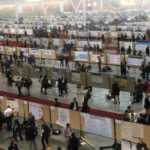I’m writing this column in my hotel room in rainy, somewhat chilly, Copenhagen. So much for the summer dresses that I packed in preparation for attending this European League Against Rheumatism (EULAR) meeting. Instead it’s been all about layering and trying to stay dry, dodging puddles, and struggling with blown-out umbrellas. The rain has impeded any desire to explore Tivoli gardens, but it hasn’t dampened the friendliness and welcome of our European counterparts in EULAR’s Allied Health Professionals (AHP) standing committee.
Kim Kimpton, PT, past president of the ARHP, and I were invited to attend both the EULAR AHP planning committee meeting and the AHP standing committee meeting (the equivalent of our ARHP executive committee). During these early morning meetings, we discussed proposals for the 2010 EULAR meeting in Rome. We also shared common issues of health professionals in rheumatology across the globe, such as the need to improve the visibility, education, and communication among the interdisciplinary team. Some of these issues seemed familiar to Kim and me, and others were unique to EULAR AHP—namely the challenges of multiple languages, the huge variety in health service delivery systems, the varying educational levels, and the scope of practice for disciplines across the European countries.
Kim and I were also invited to help staff the AHP booth between scientific sessions. This booth proved to be a welcome networking spot for all health professionals. I not only shared potato mayonnaise sandwiches (don’t ask—apparently it’s a Danish delicacy) and convivial conversation with nurses from the United Kingdom, physical therapists from Poland, and occupational therapists from Norway, but I also helped distribute information about ARHP e-learning products (such as our fabulous NP & PA Postgraduate Rheumatology Training Course, and the ability to download sessions from our ACR/ARHP Annual Scientific Meeting using Session Select). During one lunch break, I participated in a lively discussion with a group of ten psychologists lead by Eric Taal, PhD. During this meeting, we initiated a collaboration to develop future psychology educational sessions.
So, how was the EULAR meeting different than the ACR/ARHP Annual Scientific Meeting? For a start, the opening ceremony was a combination of lectures, award presentations, and entertainment. Although I particularly enjoyed the performance of the Tivoli guards and the Royal Copenhagen Ballet, I was intrigued by the EULAR rheumatologists’ chorus. This large group performed a delightful selection of Danish folk songs.
Although there are fewer AHP sessions at EULAR (13 compared with 60 for ARHP at our Annual Scientific Meeting) the format of the AHP scientific sessions was familiar, and thankfully, for me, the official language of the meeting was English. It was impressive how complex scientific findings were seamlessly woven together thematically in each session by four speakers representing different countries and different disciplines, and who typically didn’t speak English as their first language. I especially enjoyed a session with speakers from Norway, France, the United Kingdom, and the Netherlands titled, “How To Improve the Methodological Standards in Clinical Trials for Non-pharmacological Treatment.”
As a psychologist, I was also fascinated by a joint session of AHP, EULAR, and People with Rheumatic Disease in Europe called, “The impact of rheumatic disease on family life.” This session included presentations by individuals with rheumatic disease, family members of those with rheumatic disease, and an internist who treats patients in his rural practice in the United Kingdom. Providing a platform for the patient’s perspective in a scientific meeting enriches a health professional’s learning experience, and I was impressed by the speakers’ moving, thoughtful, and often wryly humorous observations.
So, was it worth the long flight, the jet lag, the rain, and the time away from work and family? Absolutely! This is a wonderful opportunity to network with international colleagues and develop collaborations with health professionals in a multitude of countries. I have learned so much these past few days, and have come to appreciate our differences and our shared challenges. It has made me aware of how much the ARHP has grown over the past 40 years, and has made me very appreciative of the great partnership we have developed with our ACR colleagues.
Dr. Degotardi is immediate past president of the ARHP and was a EULAR delegate.


